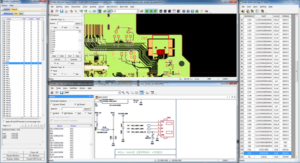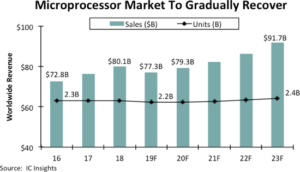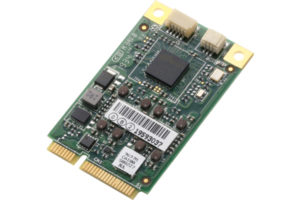
EDACafe Editorial Roberto Frazzoli
Roberto Frazzoli is a contributing editor to EDACafe. His interests as a technology journalist focus on the semiconductor ecosystem in all its aspects. Roberto started covering electronics in 1987. His weekly contribution to EDACafe started in early 2019. Li-Ion Nobel Prize; low power MCU; European foundry events; shifting FuSa to the left; MPU and AI chip marketsOctober 18th, 2019 by Roberto Frazzoli
The 2019 Nobel Prize in Chemistry has been awarded to the three scientists who – with distinct contributions over several years – developed lithium-ion batteries: John B. Goodenough (The University of Texas at Austin, USA), M. Stanley Whittingham (Binghamton University, State University of New York, USA), and Akira Yoshino (Asahi Kasei Corporation, Tokyo, Japan Meijo University, Nagoya, Japan). The official press release from The Royal Swedish Academy of Sciences briefly summarizes the history of lithium-ion batteries development, a key achievement fueling today’s fastest-growing electronics applications such as smartphones, electric vehicles and IoT. A 6.88 µW/MHz MCU But even with Li-Ion batteries, power consumption is still a sensitive issue for IoT devices, and the race to reduce processors’ power needs continues. The latest announcement is this area comes from German IP provider Racyics, that has developed a 100MHz Arm Cortex-M4F microcontroller test chip with 84kB of SRAM, which demonstrated an efficiency of 6.88 µW/MHz. The test chip is built with GlobalFoundries’ 22FDX process platform, that enabled high efficiency thanks to its adaptive body bias (ABB) tunability. With this feature, transistor threshold voltage can be tuned to match the required combination of energy efficiency, performance, area, and reliability. Racyics’ design IP enables the creation of circuits with operation down to 0.4V by holistically considering process, supply voltage and temperature inputs.
Samsung Foundry addressing the European automotive market The Racyics MCU was announced at GlobalFoundries’ Global Technology Conference (GTC), that was held in Munich, Germany, on October 11th. The Bavarian capital was the center of foundry events last week: also the Samsung Foundry Forum (SFF) 2019 took place in Munich, the day before (October 10th). The Korean company confirmed its interest for the European automotive market showcasing “tailored” solutions. Samsung is currently producing several automotive chips for driver assistance and car infotainment systems, mainly based on its 28nm FD-SOI and 14nm process nodes. The foundry plans to expand its automotive process nodes to 8nm soon. Samsung has received the ISO 26262 certification for functional safety in automotive components from TÜV Rheinland. Native automotive solutions from Synopsys And speaking of automotive, the “shift left” concept in EDA solutions for these applications now translates in a new buzzword: “native”. Synopsys just introduced this term with its announcement of new “native automotive solutions” for more efficient SoC design. Native clearly means that the requirements posed by autonomous driving and advanced driver-assistance systems (ADAS) have been considered since the beginning, resulting in solutions that are different from those used in mainstream applications. This particularly refers to achieving target ASIL (automotive safety integrity levels), a goal that requires functional safety (FuSa) mechanisms such as triple-mode redundancy (TMR), dual-core lock-step (DCLS), and failsafe finite state machine (FSM). As Synopsys explained in a press release, native automotive EDA solutions enable designers to generate their FuSa intent early in the design flow; this intent will then be used as input and maintained throughout the design flow. Acquisitions Besides the above-mentioned low power MCU announcement, another recent news from GlobalFoundries is the acquisition of the PDK (Process Design Kit) engineering team from Smartcom, a company based in Sofia, Bulgaria. The Smartcom team – more than 125 employees – has supported GF’s PDK development since 2015, for platform technologies spanning from 350nm to 12nm. A second recent acquisition has been carried out by Altair, a company that provides software and cloud solutions in the areas of product development, high performance computing and data analytics. Altair has acquired Polliwog, a Korean EDA vendor whose customers include Samsung and LG Electronics. Polliwog’s product offering includes a PCB modeler, simulation solvers, and design verification tools. Microprocessors sales down 4% in 2019 According to IC Insights’ recently updated forecast, after nine years of record sales the microprocessor market is expected to end 2019 with worldwide revenue dropping 4% to about $77.3 billion. Among the causes of this slowdown, the report cites weakness in smartphone shipments, excess inventories in data center computers, and the global fallout from the U.S.-China trade war. Microprocessor sales are expected to recover slightly in 2020, growing 2.7% to $79.3 billion, and to reach a new record-high level of about $82.3 billion in 2021. AI chipset market growing Much smaller, but growing quickly, is the edge AI chipset market: ABI Research estimates that it will grow from $2.6 billion in 2019 to $7.6 billion by 2024, with no vendor commanding more than 40% of the market. Not surprisingly, the leader of this market is Nvidia, with a 39% revenue share in the first half of 2019. According to ABI Research, moving forward the AI chipset vendors will likely choose to target one of three different market segments: the AI-enabled on-premise server and gateway market; intelligent edge devices and nodes; or low-cost and battery-powered end devices that feature minimal computational capabilities and long useful lives. New AI modules and cards Recent AI news include announcements from Kneron (San Diego, CA) and from French startup Mipsology. Kneron’s KL520 SoC has been adopted by AAEON (a designer and manufacturers of IoT solutions, member of the ASUS Group) for a family of edge AI modules targeting IoT, smart home, security, and mobile devices. Each module supports a different standard PCB interface and is designed to accelerate general AI models such as facial and object recognition, gesture detection, and driver behavior. Mipsology has announced that its Zebra software now supports the Xilinx Alveo U50 Data Center accelerator card. The company describes Zebra as a “plug & play software for accelerating AI inference and delivering the best performance on FPGAs”, concealing the FPGA hardware to AI users. The latest Alveo accelerator card has a small form factor and a power consumption of just 75W. According to Mipsology, this new Zebra-Alveo solution can replace CPUs or GPUs for inference in a data center or at the edge with several benefits, such as higher performance and ease of use. Upcoming event: Linley Fall Processor Conference And AI will be one of the key themes addressed by speakers at the upcoming Linley Fall Processor Conference. Organized by The Linley Group, publisher of the Microprocessor Report, the event will take place on October 23 – 24 in Santa Clara, CA. The conference program features more than 25 technical talks by technology experts exploring the latest processors and IP cores for AI applications, automotive, embedded, data center, IoT, and communications. At least nine companies will be announcing new products or technologies at the event, including Intel, SiFive, GrAI Matter Labs, BrainChip, Cornami, Mythic, NovuMind and Synopsys. Featured keynotes include Facebook’s Misha Smelyanskiy and Linley Group Principal Analyst, Linley Gwennap. EDACafe is planning to report about this event. |
|
|
|||||
|
|
|||||
|
|||||










